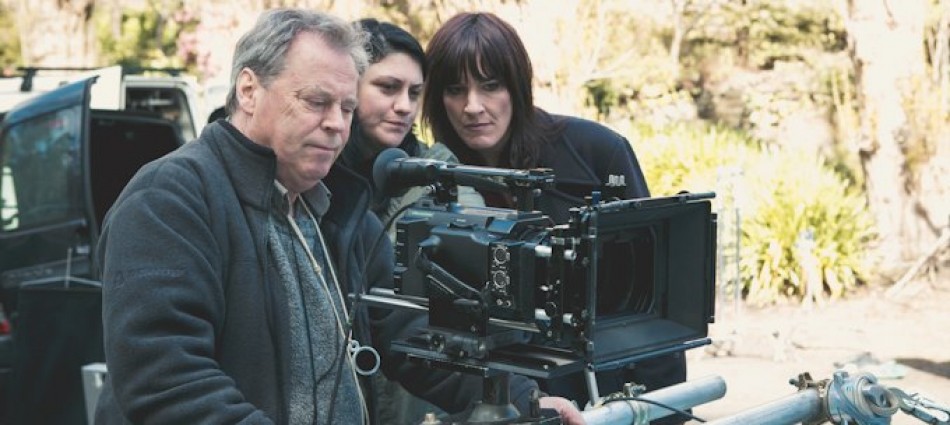
Bec Kingma profile interview on ArtsHub
In the lead up to Kingma’s Silent Night screening at Cockatoo Island Film Festival in October, artsHub grabbed the chance to interview the director and find out more about her motives behind making films.
Click on the artsHub image to view full article.
BEC KINGMA
By artsHub artsHub | Monday, October 08, 2012
What did you want to be when you grew up?
While spending a lot of my school holidays out on my uncle’s sheep station, I thought it would be cool to be a jillaroo. That wore off pretty quickly once I hit puberty.
When did you know you would work in the arts?
I don’t know that I ever really thought I would work in the arts. I was just always making stuff and that led me down this slippery path. I studied visual art and then jewellery and object design. Then I gave away the arts altogether for a while to become a vet nurse, and didn’t come back to it until my early 30s when I packed up and moved to Melbourne from Sydney.
How old were you when you knew you wanted to be a filmmaker? And was there a particular film or filmmaker that inspired this decision?
I would really love to be able to say that it was when my eyes could first focus on the beauty of the big screen, but the truth is that it was at 33, which isn’t very long ago considering I’m 37 now. Being a filmmaker is something that I always thought other talented people did. My 20s were a tough time and I wouldn’t have been able to commit to something as demanding and intense as filmmaking, not in the way I can now anyway. When I first started studying film at the VCA I was blown away by all the young talented kids in my year. Pure cinephiles who had been making films before they had pubes. It was quite intimidating. I consoled myself often with the notion that I had more stories to tell from my greater life experience, and that surely they would have to burn out having started so young.
I remember watching a short film by Glendyn Ivin called Cracker Bag. I remember thinking to myself, ‘I could do that’, or maybe it was, ‘I’d like to do that’. Either way, I think it was one of the first times I was really inspired to check out what filmmaking was all about.
Describe your first experience with filmmaking.
After I decided to give filmmaking a go, I enrolled in the Foundations course at the VCA, where I made my first film Trunk. It was shot in black and white with a super eight camera, consisted of one shot and was a minute long. Trunk was an odd little film where people would pay this seedy looking guy a wad of cash to get in and out of his 56
Vauxhall’s boot. Needless to say it was no Citizen Kane but it was a beginning and I was just happy to have gotten an image back after processing.
Can you tell us about the genesis of your film?
Silent Night is a personal story. I started writing the script after having been contacted by the police and asked to give a statement about the sexual assault on my friend in a country town where we had lived over 17 years prior. I had never told anyone about that night and never thought my friend was going to press charges, but she found the courage 17 years later. The case had been reopened but was eventually dismissed due to a lack of physical evidence. This shook my world up all over again. I had spent a lot of time putting that time behind me and I guess, being a writer, I transformed the emotions I was feeling into a script and then a film. As I shared my script and later my film with people, they responded by sharing their own stories and I became acutely aware of the relevance my film.
Making a personal film like this on a low budget was tough. I had to rely on the quality of the script to pique interest and get favours. Ellery Ryan (Van Diemen’s Land, Spotswood) was one of the first people to come on board as cinematographer. He worked so hard for this film and I learnt so much from working with him. I think I felt like a real director for the first time while working with Ellery.
Please describe your film for us?
This is where I would usually copy and paste my prepared synopsis but instead I might just explain it in a less polished way. Silent Night is really the story of how I felt after my friend was raped by two men after we went out drinking one night in the country town we lived in. I made it home that night and my friend didn’t. I was 18, sheltered, and unprepared for the harsh lesson life dished out to me the morning my friend rang me and told me what had happened to her. Both our lives went down different paths as a result, we had no choice but to leave town after the men kept taunting us in the weeks that followed. My path was one of guilt and mistrust, hers one of shame and self-hatred. I wanted to tell Silent Night from a different perspective. I didn’t want it to be a film about a rape victim. This was my story and I wanted to show how these acts affect more than the victim themselves. I never chose to make this film, it just wouldn’t go away until I made it. So I did.
Which parts of the filmmaking process do you enjoy the most? The least?
Directing is where I get my high. Directing a low-budget film can be intense, you have to have your finger in every pie and you also have to know all the ingredients with which to make that pie. It’s a tough gig because something beyond your control will inevitably go wrong, something that you can’t plan for, and everyone looks to you for the answers. But every now and then all the pieces magically fall into place, you’re in the zone and it becomes a zen-like experience. My mum once told me that the mind has a way of making you forget the pain of child birth, because if it didn’t nobody would ever go back for a second round. I think the same principles must apply to low-budget film making.
What were your biggest challenges whilst making your film?
I guess the biggest challenges were the places I had to go to in my head, due to the intensely personal nature of the story. I was physically and emotionally drained by the end of filming, but it was a cathartic experience. I see it as a story worth having told, not only for the audience but also for my own well-being.
What else do you do to pay the bills?
I make music clips and work on whatever anyone throws my way with film-related work. On the side, I also mend clothes for my friends when times get really tough. It’s been an eye-opening year since uni finished, and I’m still relying on Centrelink most of the time to keep me stocked up on baked beans and 2-minute noodles.
Which films/directors do you think have most influenced your filmmaking process and work?
Lynne Ramsay is a big one for me. Her naturalistic approach in her early films such as Ratcatcher and Morvern Callardefinitely had an impact on my direction as a filmmaker. Ramsay has been known to use non-actors for her films. She isn’t afraid to cast the real thing – a tough job to find them I imagine, but it has paid off for her. This is a process I am
interested in exploring for future projects. I think drama is one of the toughest genres to pull off successfully and this is my focus at the moment, after having started out making more comedic films. Some of my favourite filmmakers are able to blend the complexity of drama with a touch of comedy. I think the Coen brothers do this exceptionally well.
What is the best piece of professional advice you’ve ever been given, and who gave it to you?
‘Don’t treat your cast and crew like crap because you never know who that person might be in the future’. I honestly can’t remember who first mentioned this to me, but it has stuck. It might seem like a pretty obvious bit of advice but it’s surprising how many
directors don’t see this as a valid mantra. As a director you can get this weird feeling of importance and it can go to your head, and suddenly you find yourself speaking to people like they aren’t human. Films don’t get made by yourself and it’s imperative to build relationships with cast and crew now, so you can all benefit later. The film industry is tough enough as is. You’ve got to be crazy to forget the people that help you get ahead.
How important it is to you that your film receives festival exposure?
Very important. I think my film is relevant to a lot of people and I’m pretty proud of what I achieved under really difficult circumstances. Nobody makes a film and just wants their friends and family to watch it then put it on a shelf. I also know it’s hard to get a 27-minute short film accepted into festivals, but I hope the quality of the work compels festivals to make an exception. Silent Night was always a going to be a long short. The story is actually way bigger than is contained in this film. I’m currently writing a feature script that focuses on the male characters of the film and their friendship. I became very interested while making Silent Night in who these guys were who would plan to rape someone. When writing the script, this was something I struggled with, who are these guys? Do they have mothers and sisters and people who love them? So this is where the feature will take us. I managed to find these characters’ voices through a series of improvisation sessions that I orchestrated with a group of four actors. This was invaluable to me while in the writing process. It changed the script immensely, and I intend to continue with the same process while writing the feature script.
When audiences in Sydney leave the cinema after watching your film what do you hope they will be thinking/feeling?
I hope they sense that there is an authenticity to the storytelling. I also hope that they feel for the victims of sexual assault, and their friends and families.
What advice would you give anyone looking to break into the field?
Don’t do it if you think it will bring you fame and fortune. Most of us are poor and anonymous.
How do you know when you missed the mark?
A good indication that you’ve missed the mark is when your friends hurry out of the cinema after your screening to avoid having to lie to you about how much they liked your film. Or when they comment on things of little relevance to the overall film, like that they thought the font of the credits was awesome.
When do you know you’ve made it?
I’ll know I’ve made it when I don’t have to eat baked bean jaffles more than three times a week.
